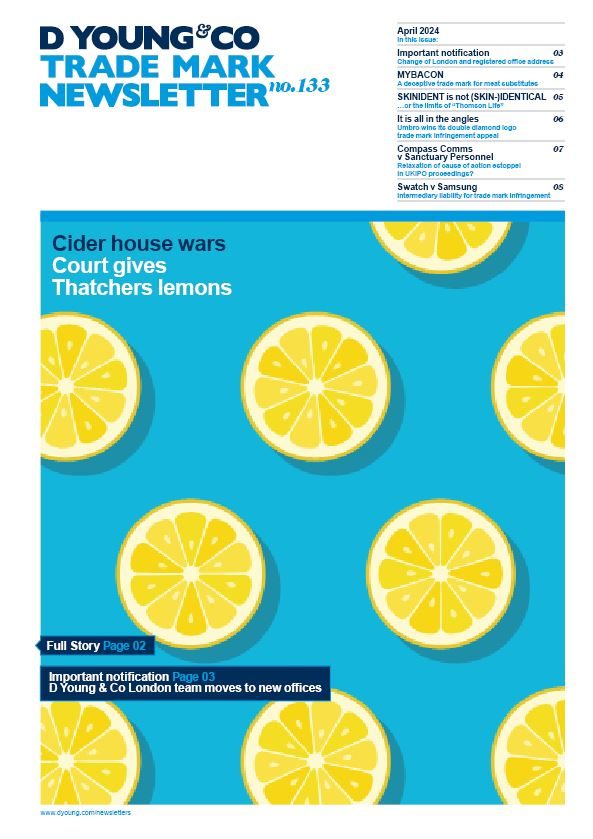Fil v Fidelis: trade mark infringement
In Fil v Fidelis, the Patents Court of England & Wales has held that Fil’s trade marks FIDELITY for ‘insurance services’, ‘financial services’ and ‘investment services’ are not infringed by the sign FIDELIS. The case demonstrates the increasing issues with enforcing trade marks where the class of goods or services for which they are registered is broad.
Fil provides investment management services, having traded in the UK under the brand FIDELITY since 1979. The presiding judge, Mr Justice Arnold, described its business as:
... one of the largest and best-known investment and asset management providers in the UK.
Fidelis underwrites speciality insurance, reinsurance and retrocession, having started underwriting insurance risk in the UK in 2016. Notably, speciality insurance is provided only to commercial undertakings, and not to the retail market.
Having commenced trade mark infringement proceedings against Fidelis, Fidelis counterclaimed that the trade marks were invalid and denied infringement. Among others, Fidelis ran the following arguments:
- Fidelis contended that the FIDELITY trade marks were invalid in so far as they were registered for insurance services. It reasoned that fidelity insurance (insurance taken out by an employer to indemnify it against losses incurred through the dishonesty or non-performance of an employee) was a recognised type of insurance and, therefore, the trade mark was descriptive. Fil contended that this objection could be dealt with by excluding "fidelity insurance" from the specifications of services of the trade marks. Mr Justice Arnold agreed.
- Fidelis contended that the trade marks were invalid in so far as they were registered for ‘financial services’ since that term lacked clarity and precision. In particular, Fidelis argued that the terms was too general and covered services which were too variable to be compatible with the trade marks’ function as indications of origin. This is a point of law which is already the subject of a reference to the Court of Justice of the European Union in Sky v Skykick. Fidelity disputed the point arguing that ‘financial services’ is clearly distinguishable from the class of goods in Sky v Skykick. Mr Justice Arnold held that Fidelis’ point was arguable, but whether or not the trade marks were invalid depended on the answers to the questions referred to the CJEU.
As a result of the findings above and other findings (in relation to, among others, bad faith and non use) infringement fell to be assessed in relation to one European Union trade mark for FIDELITY (EU925) in relation to ‘investment services’, ‘pension-related insurance services’, and ‘financial services other than insurance services’.
The court held that Fil enjoyed enhanced distinctiveness for FIDELITY for investment services and that the marks (FIDELITY) and sign (FIDELIS) were visually, orally and conceptually similar. The case turned, however, in the attributes of the average consumer, who was held to be highly knowledgeable, careful and attentive. Assessing infringement, Mr Justice Arnold concluded as follows:
The distinctive character of EU925 and the similarities between FIDELITY and FIDELIS both support the existence of a likelihood of confusion. Fidelis' services are similar, but not identical, to those for which EU925 is validly registered. This also provides some support for the existence of a likelihood of confusion, particularly given that the evidence shows that there is a tendency towards convergence between different areas of financial services, and in particular between insurance and investment. The key factor in my judgment is the high degree of knowledge, care and attention exercised by the average consumer. Despite the distinctive character of EU925, the similarity between FIDELITY and FIDELIS and the similarity between the respective services, I have come to the conclusion that the average consumer is not likely to be confused. This conclusion is supported by the absence of any evidence of actual confusion.
Link to full decision [2018] EWHC 1097 (Pat)
FIL Ltd & Anor v Fidelis Underwriting Ld & Ors [2018] EWHC 1097 (Pat) (11 May 2018), follow link for full (Bailii) decision.
Fil v Fidelis bailii decision